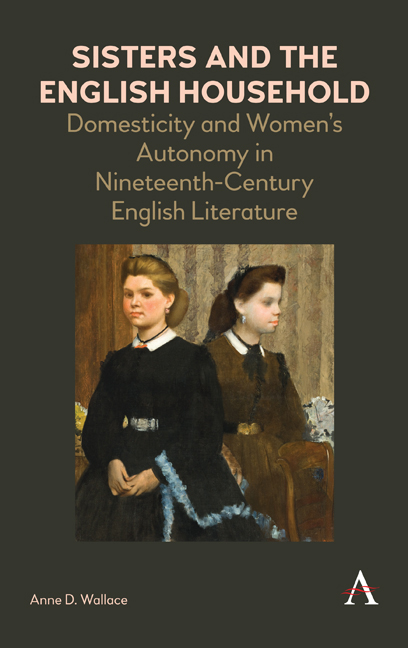 Sisters and the English Household
Sisters and the English Household Book contents
- Frontmatter
- Dedication
- Contents
- Acknowledgments
- Introduction
- 1 Alternative Domesticities: Revaluing the Sibling in the House
- 2 “Out into the Orchard”: The Departure of the Sibling in the House
- 3 The Problem of the Sister in the House
- 4 George Eliot's Natural History of the English Family
- Notes
- Works Cited
- Index
2 - “Out into the Orchard”: The Departure of the Sibling in the House
Published online by Cambridge University Press: 29 May 2019
- Frontmatter
- Dedication
- Contents
- Acknowledgments
- Introduction
- 1 Alternative Domesticities: Revaluing the Sibling in the House
- 2 “Out into the Orchard”: The Departure of the Sibling in the House
- 3 The Problem of the Sister in the House
- 4 George Eliot's Natural History of the English Family
- Notes
- Works Cited
- Index
Summary
In the summer of 1992, I spent my break from teaching in the University of Southern Mississippi's British Studies program in Grasmere, reading in the Wordsworth Library and enjoying once again the evocative beauty of that village and its setting. I happened to be there during the annual Summer Conference, and the Wordsworth Trust (then directed by Robert Woof) extended the courtesy of including me in some of the tours. It was in the sponsored tour of Dove Cottage that I heard the story, told by one of their guides, that the door leading from the staircase directly into the orchard had been built so that William could go straight outside, avoiding the distractions of “domestic chaos” (this is the phrase I noted at the time) when he wanted to walk and compose.
This drew chuckles from the listeners, including me. Later, though, I thought more seriously about what this might mean, and went looking for the story's textual traces. In a letter answering my inquiry, Jeff Cowton, Registrar of the Trust at that time, pointed me toward “correspondence with the Clarksons of 1804 discussing the benefits of the new door,” but went on to suggest that “the issue of ‘domestic chaos’ has been described as ‘oral tradition,’ but that is perhaps giving too much support for what is an interpretative point.” Indeed, the March 25, 1804, letter from Dorothy Wordsworth to Mrs. Thomas Clarkson— the only one I have found that refers to the door— seems to mix, rather than separate, the domestic and the artistic in its brief postscript reference: “We have got the door made at the staircase. It is quite delightful. We often thank you and your sister for the pleasure it gives John [William and Mary's son, less than a year old] and all of us. Whenever John gets a hurt we carry him to it and he is still in a moment, he sees himself in the glass or looks out into the orchard” (Early Years 462). In Dorothy's account, the door affords “pleasure” not just to the baby but to “all,” to the “we” who “have got the door made”: the domestic improvement is clearly practical, and “pleasure” is no doubt intended in its general sense here, but in this household “pleasure” also potentially implies literary purpose, resonating with William's and Dorothy's uses of the word in earlier years.
- Type
- Chapter
- Information
- Sisters and the English HouseholdDomesticity and Women's Autonomy in Nineteenth-Century English Literature, pp. 55 - 84Publisher: Anthem PressPrint publication year: 2018


